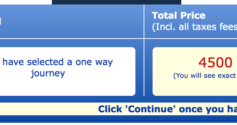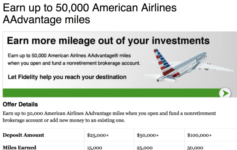If you are considering booking travel or signing up for a new credit card please click here. Both support LiveAndLetsFly.com.
If you haven’t followed us on Facebook or Instagram, add us today.
I recently commented on the government’s website for USA Today regarding changes to CFR 399.88 which requires airlines to be accountable for their prices, mistakes or otherwise. Some of my colleagues at UPGRD may disagree with my position, but I wanted to post these thoughts for everyone to see. I am unashamed of what I believe on this issue, but wanted to provide some context.
For the uninitiated, a couple of years ago the US Department of Transportation (DoT) issued a rule that stated airlines were required to honor all ticketed fares “even in the case of a mistake” to avoid murky issues of airline price marketing. Then Twitter, Flyertalk, and blogs like those at UPGRD came into the picture and magnified the issue by making others aware of the mistakes and it was no longer just the insiders in isolated cases getting mistake fares, but losses resulting in the tens of millions of dollars. However, since this rule was published new entrants to the US market have made prices so low in cases that no fare appears to be a mistake, and what’s more is that traditional carriers often have competed on these prices, especially from the west coast to Europe.
Here is a link to log your own comment with the government. Feel free to argue against me either there or in the comments. I am a fan of open dialogue.
There has to be some way for the consumer to tell if a fare is legitimate, and will be honored. If the airline can choose to correct a mistake by voiding sold tickets but consumers can’t, the system is unbalanced.
Currently, operators Norwegian Air Shuttle and WOW Air have entered the trans-Atlantic market with shockingly low prices. The latter entered fares that were not mistakes of $99 each way. Additionally, there are business class fares currently in the range of $1200 to and from Europe on every alliance, yet British Airways claimed that $1800 fares form Austin to Dubai were clear mistakes. How can a consumer know that when they book a $200 ticket to Iceland that the fare is valid, or that $1800 to Dubai is a mistake when competitive fares are still in that range? Emirates also sold tickets (and does so frequently) in pairs for $899 from JFK-Milan, that’s less than $450/person all-in, and United has fares to Hong Kong from Philadelphia for less than $550 today (5/20/2015).
Average consumers can’t be expected to understand complex fare construction and know, for example, that YQ (commonly used fare code for fuel surcharges) are meant to be included in some fares (British Airways) and not in others (American Airlines). If the YQ is absent, British Airways would call it a mistake fare, but buyers of tickets on their partner American would not know to look for that, identify the error, and then avoid the booking because it had been mislabeled.
Airlines had carte blanche before CFR 399.88 was in place to choose when they would and would not be responsible for their mistakes. They could choose to “honor” a fare out of goodwill, or to avoid legal action, but this is unfair to consumers. If I, as a consumer, buy a product and make a mistake when I purchase it I don’t get to choose whether or not to “honor” my original purchase, but rather I am subject to the company’s return policy which is non-uniform and can vary store to store and state to state.
I would not argue that the advent of resources in the frequent flyer community make these mistakes much larger than they were before, however, these same conditions exist elsewhere in industry. Twitter, blogs, and forums exist in every niche community from “mom” groups to players of certain video games. Dansdeals.com is a site where bargain hunters go to find great deals and occasionally price mistakes are highlighted on the site. However, if an order is processed – mistake or not – in most states the vendor is liable for the price they agreed upon with the customer. Why is airfare different?
The title of this proposed rule: Transparency of Airline Ancillary Fees and Other Consumer Protection Issues will do little to resolve the murky waters of airline pricing if carriers aren’t held accountable for what they sell. I would argue that not only should they honor their mistakes, but the legislation should be extended to cruise lines, buses, trains and hotels.
There are certainly bad actors on both sides of this transaction. Some purchased tens of thousands of dollars worth of airfare, some of which they would not even fly for pennies on the dollar during the United Danish Kroner issue, and that seems unfair to the airline. But is it not the responsibility of a business owner to make sure their merchandise is accurately priced? What would stop a gas station owner from changing the price of a gallon of unleaded from $2.99 to $.29 and then once someone has already filled their car and there is a line around the block, claiming that the price was not valid and demanding the rest of the price. “You should have know that was an error” the gas station owner might say, except that every now and again gas stations get people in the door by dropping their prices for a brief time to incredibly low rates.
Airlines can be bad actors too. Recently, several American carriers were found to have price fixed routes to Seoul or settled out of court on compelling evidence. This isn’t the first time this has happened and it is unlikely it is the last.
If I were to hold up signs with prices and routes (as listed above) without showing the airline’s name, could you tell if it was a mistake? If not, how can a consumer, and should they be liable for conducting thorough route analysis to determine that this carrier would go low but not that low?
Finally, we live in an era where Twitter, forums, and other online presences can compound an issue for any business – airline or otherwise. That does not mean the DoT should allow them to no longer be responsible for the mistakes of their employees or antiquated technology.
Whatever choice is made regarding this CFR, it should be forced consistently and without prejudice. If the rule stands, then United should be (in future situations) required to honor tickets, bad actors or not. Consumers will continue to be on the hook for their mistakes too. But the way the rule stands now (unenforced) is ineffective.
As a personal note of pride, that comment exactly matches the available 5,000 characters in the form. Again, whether you agree or disagree you should let your voice be heard. Here is that link one more time to submit your own comment on the matter.
-Sherpa




Excellent comment – well reasoned with examples illustrating your points. As former government bank regulator, I have read many emotional, illogical, or poorly written comments to pending bank regulations. They do little to advance the position of the writer.
I pretty much agree with your analysis to the “t”. My argument on other “consumer advocacy” websites that try to argue the opposite has been exactly what you point out – it’s virtually impossible these days for the average consumer to differentiate a mistake far from a legitimate deep discount fare, and I have grave concerns with allowing airlines carte blanche to scream “mistake” and void fares at will. Perhaps a reasonable compromise would be to allow airlines 24 hours to identify and cancel error fares, which would put them on an equal footing with consumers who can do the same. But I’m vary of even that, because I could see airlines pulling all sorts of chicanery; i.e. American has second thoughts about offering $1,700 J fares from DFW to CDG and decides to call them a “mistake” the next day.
Beyond that, though, I strongly believe that while yes, mistakes happen, business of any kind should be held accountable for their lack of care. If I mess up and forget a month’s worth of time when sending a client a final bill for a tax return, I don’t get to go back a week later and say “oops, I messed up, here’s another bill for $1,000”. I get to eat the mistake, and hopefully learn to be more careful next time (and yes, I speak from experience at my old job, which got me a talking-to from the engagement partner about attention to detail). Why should airlines be allowed to operate using a different set of rules?
@Jana – Thanks for reading, I appreciate your perspective. Feel free to add your thoughts.
@MeanMeosh – The thought that the government has just thrown their hands up and said, “we are so inept at actually doing something to update or change our regulations that we aren’t going to enforce the current ones, because we know we won’t get a correction in place before this happens again”. If a business operated like that they would be shut down, if I were an administrator of the DoT that waived the white flag because I wasn’t organized enough to change a rule that wasn’t serving the original purchase, I would resign and find something else to do.